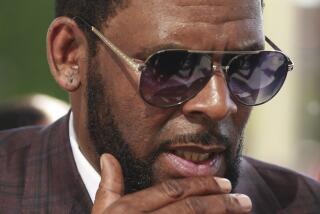Sting Clears Bootleg CDs From Shelves
- Share via
WASHINGTON — The bait was a day at Disney World and the opportunity to collect some old debts. Lured by the chance to mix business with some time in the Florida sun, 11 European and American record distributors traveled to Orlando in March. They were invited by a local distributor, who told them he was prepared to pay back some IOUs during their stay.
What the visitors didn’t know was who really was behind the invitation: the U.S. Customs Service, acting at the urging of U.S. recording companies. Sweeping into hotel rooms one by one, federal agents arrested the visitors.
The 10 men and one woman were charged with a total of 40 counts involving a conspiracy to make and sell bootlegs, compact discs of music that has never been officially released, such as secretly recorded concerts and outtakes culled from studio sessions.
The Orlando sting was the climax of an undercover investigation by Customs called Operation Goldmine. The yearlong investigation yielded a mother lode. When agents finished raiding warehouses in the Orlando area, they turned up 800,000 compact discs containing unauthorized recordings of performances by the Grateful Dead, Dave Matthews Band, Bruce Springsteen, Phish, Smashing Pumpkins and dozens of other musicians.
The paucity of bootlegs is sweet music to the legitimate recording industry, which has tried for years to stamp out any recording released without official consent.
“We’re ecstatic,” said Frank Creighton, an associate director of anti-piracy efforts for the Recording Industry Assn. of America, the Washington-based trade group that prompted Operation Goldmine. “The shelves are clean of material.”
Bootlegs occupy a different niche in the music world, both artistically and commercially, from pirated material. Although both are illegal, piracy typically means making and selling duplicates of legitimate releases, an activity that costs big record companies like Sony Corp. and Warner Bros. an estimated $300 million in lost sales last year. Bootlegs are recordings that the musician’s official label has never released.
There are no official estimates of the size of the bootleg business, though some observers guess that sales were easily in the millions of units last year.
Rather than hurting legitimate record sales, some people argue, “boots” actually help them by keeping fan interest alive in the months or years between authorized releases. “The people who buy bootlegs are the kind of people who have everything ever put out by the artist and still want more,” said Bill Glahn, editor of Live! Music Review, a monthly magazine that covers bootlegs.
Bootlegs used to mean scratchy, almost inaudible sound. During the 1960s rock era, surreptitiously recorded concerts of the Rolling Stones, Bob Dylan, the Beatles and others circulated among hard-core fans and early collectors, giving bootlegs a romantic underground appeal. Some groups, such as the Grateful Dead, even encouraged “Deadheads” to record and share tapes of the group’s concert performances, though the Grateful Dead and others discouraged selling these recordings.
More to Read
The biggest entertainment stories
Get our big stories about Hollywood, film, television, music, arts, culture and more right in your inbox as soon as they publish.
You may occasionally receive promotional content from the Los Angeles Times.










